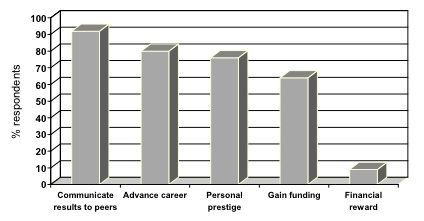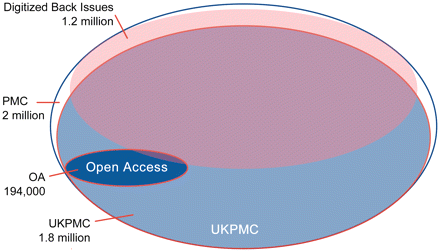Four weeks ago I wrote about the Beyond the PDF workshop that is planned for January in San Diego. The goal of the workshop is to identify a set of requirements, and a group of willing participants to develop open source code to accelerate scientific knowledge sharing. The Google Group for the workshop has already seen a lot of interesting discussions.
In December I am hosting the blog carnival Medical Information Matters, a blog carnival about – medical information . The deadline for submissions is next Tuesday, and I have already received a number of interesting posts.

Earlier today I gave this presentation at the DINI/Helmholtz Repositories Workshop in Berlin. I’m looking forward to the second day tomorrow.

When we want to change something, we have to look at the incentives for those involved.References Swan, A. (2006) The culture of Open Access: researchers’ views and responses. In: Open Access: Key Strategic, Technical and Economic Aspects , Chandos.
On Monday I was finally able to start the clinical trial Everolimus for patients with relapsed/refractory germ cell cancer (RADIT), and I’m now looking forward to recruit the first patient. We aim to treat 25 patients with cancer of the testis with the mTOR inhibitor everolimus in this phase II trial, and eight German hospitals are participating.
On Saturday I went to see the exhibition Evolving English at the British Library in London.

Last Tuesday Nucleic Acids Research published a nice paper describing the UK PubMed Central (UKPMC) database (McEntyre 2010). UKPMC was started in 2007, the enhanced version described in the paper was launched January 2010. In November 2009 I published an interview with Phil Vaughan, the senior author of the paper.
Earlier today I gave a short presentation about the Scientific Attribution Principles I posted here two weeks ago.
Thanks to a lot of hard work both at Nature Network and here at PLoS Blogs, all blog posts and comments from my former blog at Nature Network (August 2007 to August 2010) are now also available here. Special thanks go to Lou Woudley and Brian Mossop who made all this happen. There are of course a few formatting glitches here and there, but I will try to fix them over time.
The Open Researcher & Contributor ID (ORCID) initiative is working on a unique researcher identifier for the creation of a clear and unambiguous scholarly record. The initiative is supported by more than 140 universities, research institutes, funding organizations, publishers and other organizations interested in scholarly communication. The ORCID system will become publicly available in the first half of 2011.